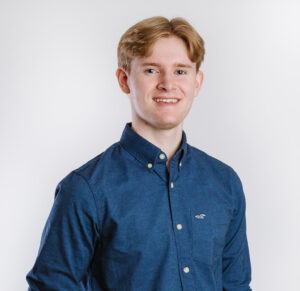 Hi everyone! My name is Jake McGillion-Moore and I’m a third-year student from Westport, Connecticut, pursuing a double major in neuroscience (B.S.) and biology (B.A.) with minors in chemistry and business administration. I’ve always had an interest in health, which has lead me to explore the many different facets of the healthcare space, one being my current position as a Gil Intern at the 3C Institute.
Hi everyone! My name is Jake McGillion-Moore and I’m a third-year student from Westport, Connecticut, pursuing a double major in neuroscience (B.S.) and biology (B.A.) with minors in chemistry and business administration. I’ve always had an interest in health, which has lead me to explore the many different facets of the healthcare space, one being my current position as a Gil Intern at the 3C Institute.
Since fall of my second year at UNC-Chapel Hill, I’ve worked in the Todd Cohen Lab under Miles Bryan. The lab focuses on neurodegenerative diseases, focusing primarily on ALS and Alzheimer’s disease. I had worked in a psychology lab in the past, so my background primarily dealt with surveys and data collection, whereas the Todd Cohen Lab had me develop wet lab skills like cell culture, western blots, immunofluorescence, and imaging. These skills were important because my main research projects centered around investigating Alzheimer’s disease at the cellular level, where we tested different genes and their impact on the development of Alzheimer’s disease in primary neurons. While this research was thrilling, it was also narrow in its scope, which is what lead me to 3C Institute as my worksite for the Gil Internship.
To give a brief introduction, the 3C Institute is a research and development firm in Durham, NC, that develops web-based applications centered around promoting social-emotional learning and other emotional development skills in children, teens, and young adults. Some of the topics they focus on within these broad subjects are autism spectrum disorder and intellectual disability.
In terms of my role thus far at the 3C Institute, I’ve been working alongside the 3C research team lead by Deb Childress, Ph.D., who is the Chief of Research and Learning Content. I’ve gotten to experience many stages of the development process including survey building within their proprietary software, IRB proposals, grant proposals, and final product review. I’ve also done research on social-emotional learning and effective practices for teaching it in adolescents, which is a notably difficult group to positively impact.
The best part of my experience thus far in the Gil Internship has been the exposure to a professional setting within the neuroscience/psychology space. Seeing how essential communication and presentation are to the client, on top of the actual product being developed, has highlighted an aspect of business in the neuroscience and psychology space that I hadn’t considered before.
Taking all these experiences and insights I’ve gained at the 3C Institute, it’s been great getting to share these with my fellow Gil interns and hear what they’ve taken away from their internships. The Gil alumni have been a huge help as well—their career paths have been a source of inspiration as I explore my own interests in neuroscience and psychology.
